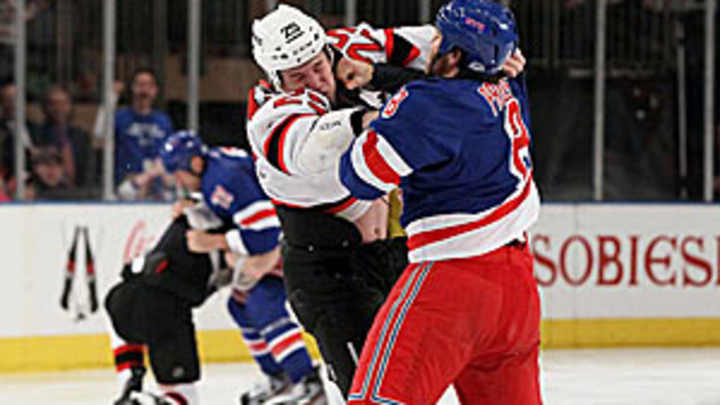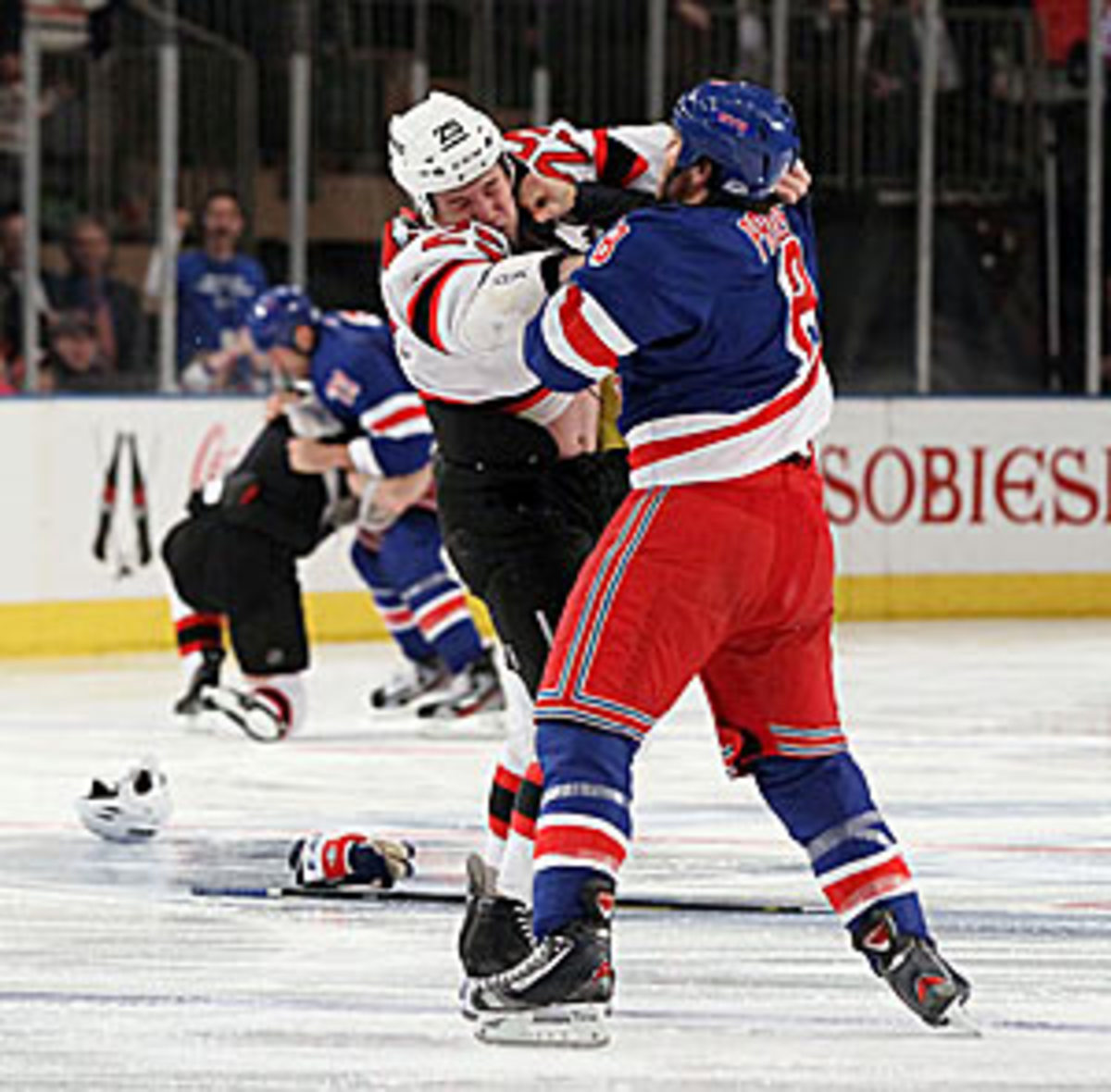Staged fights are a sorry spectacle

By dropping their gloves at the opening face-off, the Devils and Rangers had an ugly start to an otherwise clean game. (Jim McIsaac/ZUMAPRESS.com)

By Stu Hackel
At what point does the NHL and NHLPA decide that moronic spectacles like the "appointment fights" at the opening face-off of the Devils-Rangers game on Monday night are really not good for the game and actually do something about them?
The three simultaneous bouts that commenced at the drop of the puck serve absolutely no purpose other than to brand a major league sport as something less than it is. Yes, it's Slap Shot. And keep in mind that Slap Shot was about mid-level minor league hockey, the fictitious Federal League based on the old, real-life Eastern League where the quality of play and the players weren't good enough to sustain interest unless there were some cheap thrills thrown in.
Well, cheap thrills are not what the NHL is supposed to be about. But that's what was served up in the world's most famous arena on Monday night.
Here it is, in all its raging glory:
And that happened in part because this happened five weeks ago between these same clubs at the start of a game:
These are not fights that broke out in the natural rising of tensions that can occur during a game. Now, whether spontaneous bouts are good for the NHL is a longstanding debate that has taken on a new dimension with our greater understanding of brain trauma. But these staged fights were agreed upon by the participants prior to the game even starting. They are gratuitous, fighting merely for the sake of fighting.
In this case, the visiting Devils declared their players first, and started all fourth-line tough guys, which is not a usual coaching tactic. So the Rangers matched with a tough lineup of their own, and they moved Stu Bickel, a defenseman, to center to take the opening draw against Ryan Carter, a clear sign that this was all about dropping the gloves, not playing the puck. But let's not bother pointing fingers at one team or the other here. This took place because it's permitted, regardless of which team started it.
"You can't defend it...You can be the biggest fight fan in the world, you can't defend that," SI's Pierre McGuire said Tuesday morning on Ottawa's Three Guys On The Radio program over Team 1200 (audio). McGuire had the best seat in the Garden while working between the benches for NBC Sports Network. "When you move a defenseman to center for the opening draw, that's not in the heat of passion, that's a staged fight. You're manufacturing that energy."
In fact, the belligerent players who Devils coach Pete DeBoer dressed for this game probably cost his team two points, as McGuire later noted. "The Devils were punished last night because they played guys who are pugilists....When you're playing guys like (Eric) Boulton, who's a very tough kid and a good teammate but not an overly great player, and you're playing guys like Cam Janssen, who's a very good teammate and a very tough kid but not a great player, you're going to have limited options in terms of trying to get back in the game. So they got punished for that kind of lineup."
In some instances, a coach could just elect not play those marginally talented players once they had completed their one-dimensional tasks. But the Devils play again on Tuesday in Ottawa, so DeBoer had to play a four line game Monday so his better forwards wouldn't be too tired to play their best in the second game of the back-to-back.
When the NHL really wants to remove something from the game, it passes rules against it and backs them up with strong additional on-ice penalties, fines and suspensions. For example, we didn't see these guys fight before the puck was dropped, something which used to take place in the NHL. Why? Because the league passed tough rules against it. It is now a $25,000 fine to the teams who engage in fighting other than during the actual game plus whatever fines and suspensions the league levies against the players, coaches and clubs who engaged in the incident. And a player who instigates a fight other than during the periods of a game is automatically suspended for 10 games.
In fact, the NHL tried to ban appointment fighting three years ago, when the league's GM's recommended increased punishment for fights that occur immediately after any face-off. Even Toronto GM Brian Burke, who generally supports fighting in the game said, “I don’t like those fights,” when he and his fellow GMs proposed tacking on a 10-minute misconduct to players who engaged in arranged fights.
Ultimately, the measure failed because the league's fighters -- fearful of losing their jobs in an increasingly fast and skilled NHL -- asked their union to oppose the new rule in the NHL-NHLPA Competition Committee. So staged fights continue today, punishable only by the penalties that are incurred for the fights themselves. There are no extra sanctions for their making a mockery of the game.
There has been a weeding out of "goons" in the NHL, guys whose sole purpose is to fight and whose ability to play the game at the highest level is questionable. Teams can't afford to carry them on their rosters, wasting a spot in the lineup on a player who is of little help in trying to win, so the natural competitive evolution of the sport has served to improve the talent pool in that way. Perhaps there are now also fewer goons to block another attempt at some useful rules for curbing appointment fights.
But until then, this sort of idiocy will still take place, and the NHL is poorer for it.
COMMENTING GUIDELINES: We encourage engaging, diverse and meaningful commentary and hope you will join the discussion. We also encourage, but do not require, that you use your real name. Please keep comments on-topic and relevant to the original post. To foster healthy discussion, we will review all comments BEFORE they are posted. We expect a basic level of civility toward each other and the subjects of this blog. Disagreements are fine, but mutual respect is a must. Comments will not be approved if they contain profanity (including the use of punctuation marks instead of letters); any abusive language or personal attacks including insults, name-calling, threats, harassment, libel and slander; hateful, racist, sexist, religious or ethnically offensive language; or efforts to promote commercial products or solicitations of any kind, including links that drive traffic to your own website. Flagrant or repeat offenders run the risk of being banned from commenting.
